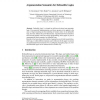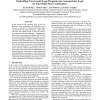1020 search results - page 23 / 204 » Tight Semantics for Logic Programs |
121
click to vote
PRICAI
2000
Springer
15 years 6 months ago
2000
Springer
Defeasible logic is a simple but efficient rule-based non-monotonic logic. It has powerful implementations and shows promise to be applied in the areas of legal reasoning and the m...
122
Voted
IJCAI
2007
15 years 4 months ago
2007
In the context of the Semantic Web, several approaches to the combination of ontologies, given in terms of theories of classical first-order logic, and rule bases have been propo...
124
click to vote
LPNMR
2001
Springer
15 years 7 months ago
2001
Springer
Much work has been done on extending the well-founded semantics to general disjunctive logic programs and various approaches have been proposed. However, no consensus has been reac...
132
Voted
ICLP
2004
Springer
15 years 8 months ago
2004
Springer
Abstract. In this paper we consider a logic programming framework for reasoning about imprecise probabilities. In particular, we propose a new semantics, for the Probabilistic Logi...
121
click to vote
LPNMR
2009
Springer
15 years 9 months ago
2009
Springer
We define the semantics of logic programs with (abstract) constraint atoms in a way closely tied to default logic. Like default logic, formulas in rules are evaluated using the cl...


